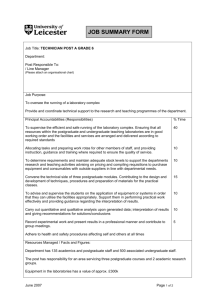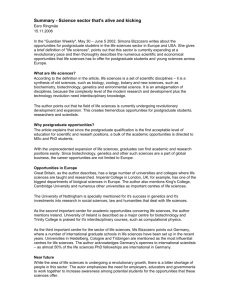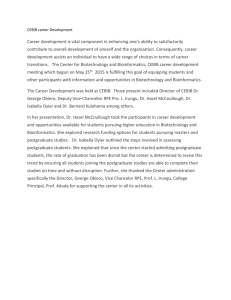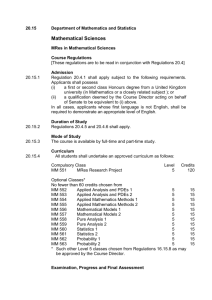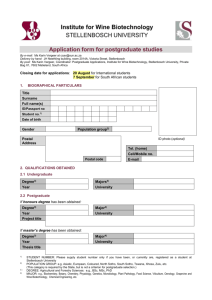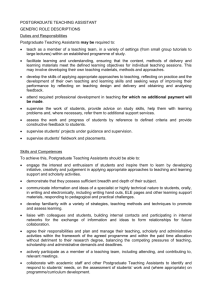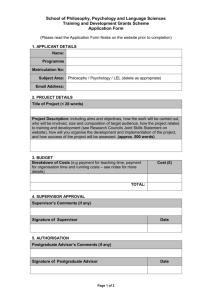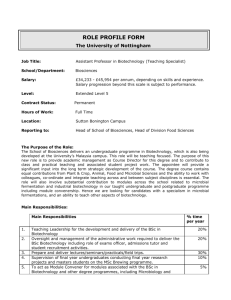Students - University of Kent
advertisement
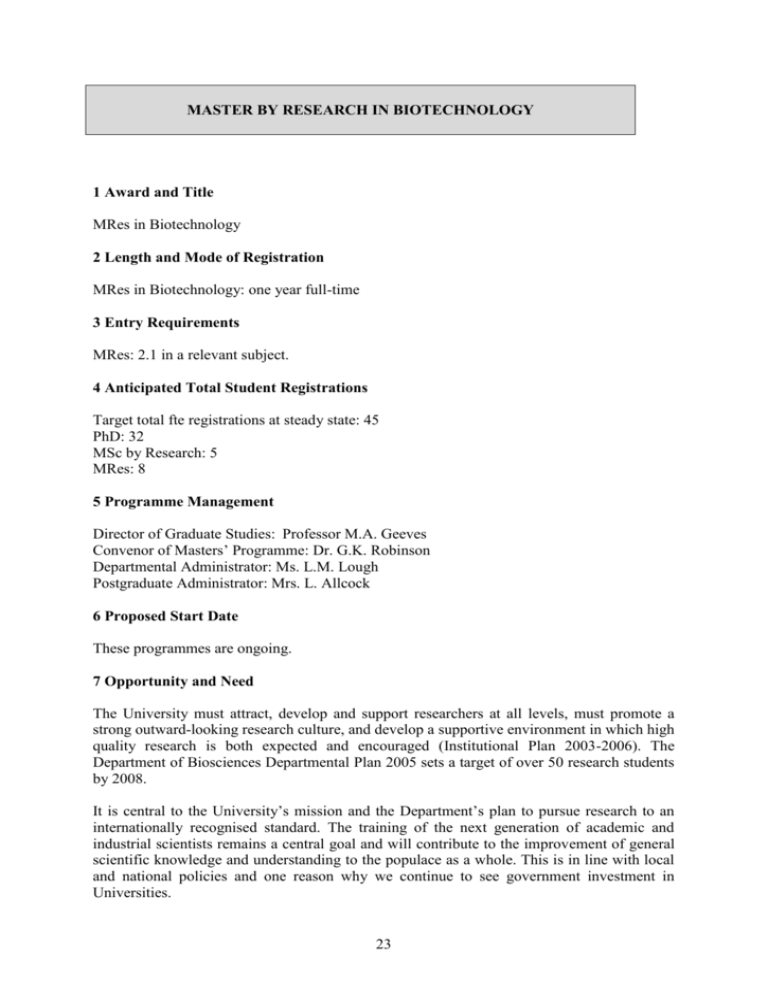
MASTER BY RESEARCH IN BIOTECHNOLOGY 1 Award and Title MRes in Biotechnology 2 Length and Mode of Registration MRes in Biotechnology: one year full-time 3 Entry Requirements MRes: 2.1 in a relevant subject. 4 Anticipated Total Student Registrations Target total fte registrations at steady state: 45 PhD: 32 MSc by Research: 5 MRes: 8 5 Programme Management Director of Graduate Studies: Professor M.A. Geeves Convenor of Masters’ Programme: Dr. G.K. Robinson Departmental Administrator: Ms. L.M. Lough Postgraduate Administrator: Mrs. L. Allcock 6 Proposed Start Date These programmes are ongoing. 7 Opportunity and Need The University must attract, develop and support researchers at all levels, must promote a strong outward-looking research culture, and develop a supportive environment in which high quality research is both expected and encouraged (Institutional Plan 2003-2006). The Department of Biosciences Departmental Plan 2005 sets a target of over 50 research students by 2008. It is central to the University’s mission and the Department’s plan to pursue research to an internationally recognised standard. The training of the next generation of academic and industrial scientists remains a central goal and will contribute to the improvement of general scientific knowledge and understanding to the populace as a whole. This is in line with local and national policies and one reason why we continue to see government investment in Universities. 23 "In the increasingly knowledge driven global economy, science, innovation and creativity are important drivers of productivity growth, backed up by a highly-skilled workforce and a competitive and enterprising economy." From The Budget 2005. Investing In Our Future. 16th March 2005 Molecular bioscience remains a core science which underpins Medicine and Biotechnology and their associated industries. It also lies at the interface between life sciences, the molecular and the physical sciences and mathematics. We encourage the development of joint programs with the Departments of Physical Sciences, Mathematics & Statistics and Computing in addition to joint studentships with Industry and other institutions. The MRes course is intended to contribute to the delivery of the Research Councils’ scientific objectives, as set out in the Science Budget 2003-04 to 2005-06 (The BBSRC Ten Year vision and the BBSRC Strategic plan 2003-2008). An overriding principle which has been considered when devising the current programme has been to ensure that the students gain access to, and benefit from, facilities and practitioners of excellent science (BBSRC Strategic Objective 1). The MRes was initially established during the competitive call for MRes pilot schemes by the BBSRC in 1995. The Department was one of nine UK institutions selected for BBSRC funding and we have continued to receive funding ever since, following several BBSRC reviews. We also recognise a role in contributing towards a greater appreciation and understanding of Integrative Biology (BBSRC. Priority 1) and the two-way understanding of potential for commercial exploitation of research activity. (Priority 4 – Bioscience for Industry). Students completing our courses go on to further study, careers in academic medical or industrial science, education and a range of other scientific and non scientific careers. (See Appendix A.) 8 Aims and Objectives The MRes programme aims to fulfil the following training requirements; (i) (ii) (iii) (iv) (v) (vi) A taught provision to provide all students with a basic grounding in Molecular Biology, Analytical Biotechnology and Statistics as well as an exposure to wider issues within the Biotechnology & Public Affairs module. The provision of a research skill set, including transferable skills, allowing the students to enhance their competencies when seeking employment or training opportunities (e.g. PhD) in their chosen field. The opportunity to do an extended research project in a well-funded and wellrecognised research laboratory, or to gain experience of research in more than one research group. The opportunity to make and exercise an informed choice about the particular research experience they seek. The opportunity to sample life in a research laboratory before committing to a longer training period (e.g. PhD) or chosen career path without first-hand experience of what it entails on a day-to-day basis. The provision of transparent benchmarking, monitoring and QA procedures especially in relation to off-site project collaborations. 24 (vii) The acquisition of a value-added postgraduate qualification which is recognised by both academia and commerce. The course consolidates the BBSRC-funded MRes Biotechnology and is a progression of the joint Pfizer/University of Kent collaborative Masters course that has developed from it (as highlighted in BBSRC Business January 2001). Additionally, collaborative projects have recently been undertaken between Biosciences and Computing/Institute of Mathematics and Statistics leading to an MSc by research and dissertation. In summary, the course will equip the candidates with an understanding of how information in the form of DNA flows from gene to whole organism, with particular emphasis on those species whose genomes have been fully sequenced and excellent database resources exist. A graduate of the course will understand and be able to critically appraise and utilise ‘-omics’ technology, especially in the context of its application for drug discovery. Objectives To understand the language and methodology of modern molecular biosciences. To generate, evaluate and integrate data arising from ‘-omics’ and maximise its utility to the widest audience. To gain an appreciation of how the findings of modern bio-technology may (or may not) be integrated to develop our understanding of organismal biology. To appreciate the business and bioscience ethos that underpin the modern pharmaceutical industry. 9 Programme Outline 9a Outline The course comprises the following modules: Taught component (October – December) - this comprises assessed (in bold) and nonassessed modules and will contribute 35% of the course marks. Induction and transferable skills (Bioscience and external). Molecular Biology (Biosciences). Analytical Biotechnology Statistics Biotechnology & Public Affairs (Bioscience and external) (Module outlines are provided in Appendix D). Project component – (January-September) – the projects build on our existing research expertise and may comprise one or two laboratory experiences so long as congruence exists between them. This allows the student to submit a cohesive dissertation which brings together two areas of research. The projects may be undertaken within the Department of Biosciences and / or Pfizer Global Research and Development (PGRD). The mark for this part of the course will comprise 65% of the overall course mark*. The students will choose a project either on application or during Term 1. Students are encouraged to interact with their chosen research group(s) as much as possible, including as time allows, during the taught component. Projects will reflect research specialisations of the 25 Department and/or will reflect the interests of our external collaborators e.g. PGRD. In the latter instance the research projects typically involve the development, evaluation or application of modern molecular methods to the drug discovery process. Typical projects have included: The application of proteome analysis techniques in studies of the effect of hypoxia on human skeletal muscle cells; Expression and pharmacological comparison of the canine potassium ion channel cERG to its human homologue, hERG; The use of NMR for drug discovery. A fuller description of these projects and others may be found at our web site http://www.kent.ac.uk/bio/study/Postgraduate/Master/Default.htm. As with all postgraduate students, a postgraduate monitoring committee (PMC) will be appointed to monitor the student’s welfare and progress throughout their time at the University of Kent. They MUST fully participate in the Graduate Development Programme which ensures that students achieve a broad training as identified by the ‘Joint Statement of the Research Councils’/AHRB’s Skills Training requirements for Research Students’ (pp. i-iii of Graduate Development Folder – Appendix H). * It should be noted that, although marks and mark schemes are used internally, the qualification is a research degree and, like a PhD, only pass or fail are awarded by the University of Kent. 9b Details of other courses students may benefit from e.g.: Health & Safety, IT, writing skills, English language, library skills etc The Development folder provides a full list of all courses provided by the Department. In addition, the University provides a range of general support courses for students and staff on basic skills such as keyboard skills, software packages, statistics, writing & language skills, health and safety, and first aid which the students can choose to access in consultation with their supervisor and PMC. This is in addition to the normal expectation that supervisors will edit and correct regular written work by students and will discuss writing skills during report reviews and the final thesis compilation. 9c Progression Milestones Students are briefed on the calendar and guidance notes contained within the Graduate Development Folder (p. 60 of Appendix H) as part of the Induction Course. All students must attend and attain the following: (i) Completion of the taught programme as outlined in Appendix D. Students attend lectures and practicals in the Autumn term and, where specified, undertake examinations in the final week. (ii) Credits – 10 Class A and 10 Class B credits within their period of registration as outlined in the Graduate Development Folder (p38). (iii) Completion of a literature review by student and MRes Postgraduate Report form 1 by supervisor in consultation with the student. This must clearly explain the hypothesis / hypotheses under investigation in the 9-month laboratory project. 26 (iv) Meeting with Masters Postgraduate Monitoring Committee (PMC) within 1 month of completing (ii). The Masters PMC comprises Dr Gary Robinson (Chair), Prof. Mike Geeves (Director of Postgraduate Studies) & Prof Mick Tuite (Director of Research). If the student is undertaking their study at a collaborating company / institution an additional representative of that company / institution may also be present. The Masters PMC meets with all students registered for MRes Biotechnology on the same day to allow the experience of the cohort to be assessed. Generic and specific feedback from the PMC is given to all students within 1 week. If required, an additional PMC may be organised within 1 month if specific issues have been highlighted / satisfactory progress is not being made. It should be noted that students can request a meeting with their PMC at any time. (v) Production of poster for Postgraduate Symposium in June. This will be coincident with the completion of MRes Postgraduate report form 2 and may be the basis for a final PMC meeting. (vi) Production and submission of MRes thesis in August. 9d Assessment Methods Although the MRes Biotechnology is a research degree, it does contain a taught component which accounts for 35% of the course marks. Students are assessed on these modules (BI801 – Molecular Biology, BI821- Analytical Biotechnology & BI 822-Statistics for Biotechnology) by both continuous assessment and examination, as outlined in Annex D. Students must obtain a minimum of 40% to progress to the project component but all progression is at the discretion of the PMC. After submission of their MRes dissertation, all students undergo an internal viva voce examination by a member of Biosciences academic staff. This is usually more extensive (approximately 1 hour minimum) and precedes the external examination outlined below. The report is made available to the external examiner before they undertake their own viva voce examination as outlined below. The external examiner may ask to see any of the internal examiners. In line with the ethos of the Masters PMCs, all MRes students are examined by the same External Examiner (currently Prof. J. Green, University of Sheffield) on the same day(s). The external examiner is appointed annually using the forms shown in Annex F. Each of the students presents a short (15 minutes) talk to the External Examiner in an open symposium. Thereafter, each student undergoes a viva voce examination of 30-45 minutes in the presence of the External Examiner and the Course Tutor (Dr Gary Robinson). 10 Approved Supervisors Currently all research active members of the Department have been approved as supervisors of postgraduate study by the Faculty Research & Enterprise board. A full list of approved supervisors is attached as Appendix B. 11 Research Environment The Department of Biosciences provides a structure for promoting research excellence, fostering collaboration and enhancing provision of research training. The Department was graded with a high 4A (93% submission) in the last RAE and the University and Departmental Plan aims to improve this in the next RAE. The Department has 25 academic 27 staff, 2 independently-funded research fellows and 29 research staff. There are 8 technicians and one administrator who are employed wholly on research projects. There are 5 Facility Managers, one administrator and 6 secretarial staff who spend part of their time on researchrelated matters. The Department’s external research income for this financial year is £1.7m and this is supplemented by £320k of HEFCE QR Funding. New external grants have amounted to between £1.5m and £2.7m p.a. over the last three years. Approximately 38% of this comes from charities, 36% from research councils, 20% from the EU and 6% from industry and other types of sponsor. Within the Department, research is focused on four major areas: Cancer Research, Cell and Developmental Biology, Infectious Diseases and Protein Science. These topics are not treated in separate departments but as integrated research themes within the Department. The members of each group meet regularly at research planning group meetings. This provides an attractive environment for the student since it transcends the traditional compartmentalisation of scientific approaches and techniques. All students would be aligned with one (or occasionally more) of these groups and attend the regular research seminars/discussion groups of their respective research planning group. The Department has a rigid safety policy. There is a Departmental safety co-ordinator and committee (including student representation) as well as specific staff assigned to monitor genetic manipulation, the handling of radioisotopes and the use of lasers. Each student and project is assessed for potential hazards and records kept and updated for each of the procedures used within the Department. Some of the academics in the Department have funded collaborations in the UK, Europe and beyond and students are encouraged to become involved in these wider collaborations. The Department has a strong track record of productive links with the pharmaceutical, agrochemical and biotechnology sectors both in the UK and world-wide. The Department has a full-time Business Development Officer and an academic seconded 2 days per week funded through HEIF charged with fostering industrial links. These links have – and continue to be – established through fully-funded research projects and studentships, contract research, consultancies provision of short courses (e.g. most recently for Pfizer, Zeneca and the NHS), CASE studentships and undergraduate placements (as part of our Year in Industry option). The appointment of Professor Paul Davis (Insense Ltd.) as a Visiting Professor in Applied Immunology, Dr. Graham Darby (ex-GSK) as Visiting Professor in Virology and Dr Mark Treherne (Senexis Ltd.) Honorary Senior Lecturer further illustrates our commitment to promoting academic-industrial interactions (see Appendix G for full list). We currently have research projects and studentships funded by Pfizer, British United Turkeys Ltd. and PIG Improvement Company and we have undertaken short-term research contracts for Abbott Labs, Knoll, Excyte and Channel Diagnostics. We also have strong collaborative links with the regional NHS and students benefit from joint research programmes established with NHS partners. Three members of staff (Drs. Blower, Jones and Mühlschlegel) have joint contracts with the NHS but organise their research programmes with the Department of Biosciences. We fully subscribe to the ethos that first-class, internationally-competitive research requires state-of-the-art technical support, coupled with the necessary research infrastructure. We have established four major research support facilities, each with a permanent Facility Manager: Biomolecular Analysis; Microscopy and Image Analysis; Animal Cell Culture and Protein NMR. Each facility is self-contained, aims to be largely self-supporting and 28 accessible to all research students and staff, for whom training is provided by the Facility Manager. Two of the Facilities have been established via major grant support from the Wellcome Trust: Protein Analysis (1993) and a 600 MHz NMR Facility (1996). Each of these facilities underwent a £2m refurbishment and upgrade under SRIF investment in 2004 and continue to be improved and extended in response to new staff appointments and funding initiatives, for example, a 'Fast Reaction Laboratory' (Jan 1999, Geeves), a 'Video/Fluorescence Microscopy Suite' (June 2000, Gullick) and an ‘electrophysiology rig’ (June 2000 Allen, Bloor, Phelan) have recently been established with internal (HEFCE) and external (Wellcome Trust) support. The new facilities are of the highest international standard and contain unique features, which allow us to promote them as a regional and national resource. The Fast Reaction Laboratory hosted an EMBO-workshop on ‘Fast Kinetics’ in July 2000, 2002 and 2004. The Department, with University support and part HEFCE funding, has undertaken a £1.5 million refurbishment and modernisation programme for its research laboratories since 1998 and the current programme is due to be complete in late 2005 at which time all the research laboratories will have been completely refurbished. We have continued to upgrade our intranet, which maintains over 100 terminals and have appointed a permanent IT manager. The establishment of a dedicated ‘Study Room’ in 1998, with IT facilities, has provided our postgraduate students with dedicated support facilities in addition to those provided in the research laboratory. There is also a ‘Bioinformatics Suite’ with Silicon Graphics, and LINUX UNIX workstations for dataprocessing analysis, structure determination and 3D-structure viewing. 12 Student Support and Guidance Students are provided with a copy of the STMS Faculty Handbook “Information for New Postgraduate Students” (Appendix E) and the University booklet covering regulations, Student’s Union Code of Practice and the Student Charter when registering. In addition, students are issued with the Department’s Graduate Development Folder for Research Students during the Graduate Induction programme hosted by the Department (Appendix G). All Masters’ students have the same tutor (Dr Gary Robinson) and are able to sign up to attend a weekly surgery if they wish to discuss anything course related. When undertaking their research projects, students will largely be tutored / mentored by their chosen research supervisor. In addition the Department has both a Welfare Officer (Dr P. Klappa) and a Disability Officer (Dr R. Williamson). They have primary responsibility for undergraduate students but are available for advice and as a source of information on other services in the university and beyond. The University itself provides a range of generic support such as a Counselling Service, Accommodation Office, Medical Centre and Welfare Office. 13 Departmental Quality Assurance and Enhancement Staff All supervisors of postgraduates have to be vetted by the Research Programme Approval Sub-Committee who can then recommend approval by the STMS Faculty Research and Enterprise Board and the University’s Board for Research & Enterprise (see Appendix F). Students are kept informed of relevant information via specific email lists (biology- 29 pgm@kent.ac.uk). They also receive an on-line version of the monthly Departmental Newsletter. New academic staff are expected to complete the Universities Postgraduate Certificate in Higher Education during their first two years of appointment and completion of the course is normally a condition for completion of probation. The course includes modules on “Running a Research Group” and “Supervising Research Students” in addition to courses on Applying for Funding and Publication Strategies. As part of the PGCHE, the new member of staff will have a tutor to provide advice and support. They will also have a Departmental mentor as part of the probation process to provide additional support. Newly appointed staff would normally co-supervise their first research students and they will act as one member of one PMC for students they are not supervising. This provides them with experience in the process of supervising without having full responsibility and allows them to fulfil the requirements to become approved supervisors. The PMC provides a source of advice and support to the supervisor. Established staff have access to a continuing series of Staff Development courses which cover such issues as interviewing skills, changes in Research Council policies etc. Each member of staff undergoes an annual confidential appraisal by a senior member of the Department (or Dean in the case of Head of Department). This provides an opportunity, in addition to other things, to discuss issues relating to student supervision. In addition, all academic staff meet with the Head of Department and Director of Research on an annual basis to discuss research activities, needs and future plans, including postgraduate student expectations. Students The Department has a Postgraduate Staff-Student Liaison Committee which meets formally in the autumn and spring to consider issues of general interest to Postgraduate Students and to provide a forum for exchange of information between staff and students. The committee is chaired by the Director of Graduate Studies and comprises the Convenor of Masters’ programmes, one representative from each Masters’ programme and one representative from each year of the PhD programme. The Committee meets one week before the Research Committee in the autumn and spring terms and reports to the Research & Enterprise Committee. Additional meetings can be arranged on request. In addition to representation on the Staff-Student Liaison Committee there is one PG student representative on the Departmental Research and Enterprise Committee, the Faculty Research and Enterprise Committee and the Department’s Health and Safety Committee. These committees provide a forum in which students participate in and influence the decision-making process in the Department and the University. In addition, participation in these committees is viewed as an important and integral part of the student’s training and credits in professional & transferable skills are awarded in recognition of the time involved. 30 There is a Departmental ‘Bio-Soc’ which involves both undergraduate and (predominantly) postgraduate members. This society organises social events throughout the year in which both staff & students participate. The postgraduate students also have access to the Departmental ‘T-room’ which provides an informal arena for meeting and discussion with contemporaries. External Examiner In addition to individual reports, the external examiner is also requested to comment on the process and procedures which have operated in the registration year. Comments relating to the taught courses and examination procedures are annually made and responses formulated. All processes and procedures are officially ratified through the Departmental Research & Enterprise Committee in the first instance. See Appendix F. 14 Departmental Resource Implications Students are provided with access to computers and appropriate research facilities to complete the planned programme of study and research. 15 Professional Accreditation There are no formal needs for Professional Accreditation. However, students are encouraged to join learned societies and several members of staff act as advisors for particular societies (see pp.12-13, Graduate Development Folder – Appendix H). 31
